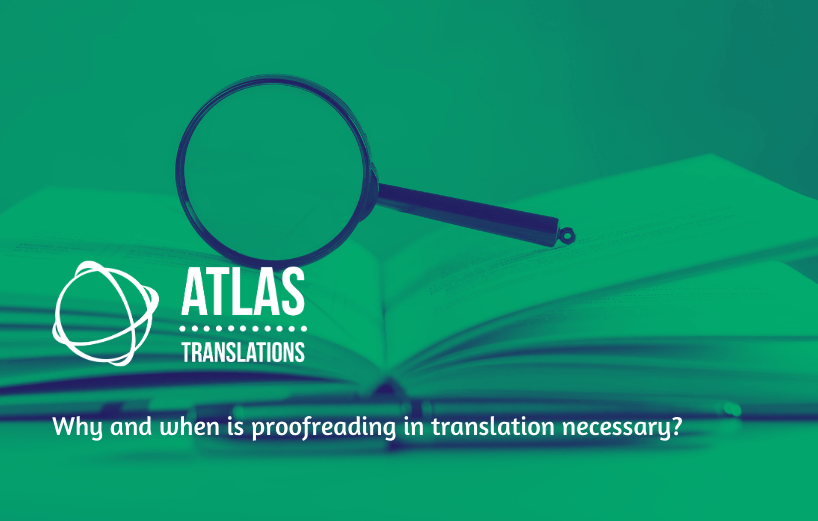Why and when is proofreading in translation necessary?

Why would we need a proofreading stage? Will the translator make mistakes? Being a translation agency, we often receive these questions from prospective clients after we have suggested proofreading. To dispel any doubts, we’re putting proofreading in the spotlight. In this blog, we’ll explain what translation proofreading involves, why you should ensure it’s included in the translation service, and the occasions in which proofreading may not be necessary.
Why bother with translation proofreading?
Chances are that when you’re writing an important email or report, you like the idea of having another person – such as your colleague or friend – give it a look to ensure there are no errors. Even the most careful writers with the best attention to detail can easily miss typos, despite reading the text ten times!
Similarly, when creating a copy or brochure in English, a second pair of eyes is often needed to make sure it is spotless, reads well and has consistent tone of voice. The process is usually collaborative rather than corrective and aims at achieving the best results.
It’s no different when it comes to proofreading in translation. Don’t we all want to make sure that the content we share with others is written well? We definitely wouldn’t like it to have embarrassing typos or other mistakes. Having input from two people, rather than one individual, is one of the best ways to limit potential issues.
What is proofreading in translation?
Proofreading is one of the steps used in translation for quality assurance. Every translator or translation agency tends to have a slightly different process in place. However, the main aim is to provide a high-quality translation which is accurate and void of mistakes.
How we go about it
At Atlas Translations, we always assign the proofreading stage to a second native translator. The proofreader compares the original text with the translated one. This is to ensure that nothing has been mistakenly omitted in the translation and that the meaning has been transferred correctly. Sometimes the original text may include an ambiguous phrase and there may be a better way to phrase it in the target language. The second linguist can look at the translation with fresh eyes and provide another point of view.
By involving a second translator, it’s easier to ensure that the translation is accurate and reads well in the target language. Of course, it also increases the chance of spotting any typos that fell through the cracks when translating. In the end, translators are humans, just like us, and no matter how many times they review the text they translated, a pesky typo is always a possibility.
When proofreading the translation, the second linguist will mark or suggest changes. The proofread translation is then returned to the original translator for their approval.
When to include a proofreading stage
As mentioned earlier, a proofread translation gives you the extra assurance that your multilingual content is a true and accurate translation of the original text. Here at Atlas Translations, we always recommend proofreading of any translated material that is destined for publication. If you know that the content will be read by a large audience and a potential mistake could affect your reputation, you should definitely consider having the translation proofread. It is also important to note that translations which are not proofread do not conform to the ISO 17100 standard.
Translation proofreading is often included when translating books, marketing content, or technical documents. It definitely shouldn’t be omitted when dealing with medical translation where accuracy is of utmost importance. In fact, when translating medical content many clients opt for the additional step of back translation.
On the other hand, if you are translating material only for information purposes, internal use, or the translation is just a formality, you may decide that there’s no need to proofread it. Ultimately, the decision is yours as you know how and where the translation will be used, the objective, the audience and how far your budgets stretch.
Whether you need to translate something for private or public use, you can count on Atlas Translations. We can also give you advice in case you’re still not certain if you should opt for proofreading or not. Just give us a call on 01727 812725 to speak to our friendly staff or email team@atlas-translations.co.uk.














